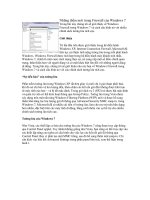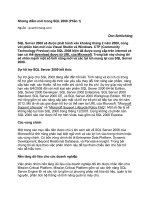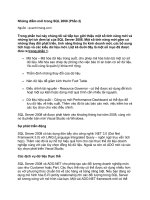Những điểm mới từ C++ tới C++11
Bạn đang xem bản rút gọn của tài liệu. Xem và tải ngay bản đầy đủ của tài liệu tại đây (994.43 KB, 52 trang )
From C++ to C++11
Hoàng Mạnh Hưng
May 2015
What is C++11?
Important changes
Getting started
2
What is C++11?
Important changes
Getting started
3
What is C++11?
•
•
ISO Standard approved on August 2011
Other name: C++0x
4
What is C++11?
Important changes
Getting started
5
Important changes
➢
auto variable
➢
Strongly-typed enums
➢
nullptr
➢
Lambdas
➢
Range-based for loops
➢
Smart pointers
➢
decltype
➢
static_assert and type
➢
Uniform Initialization &
Initializer Lists
➢
traits
➢
Move semantics &
rvalue reference
Override and final
➢
thread
6
auto variable
Earlier Version
int i = 42;
long long l = 42LL;
void (*p)(int, float,
char) = foo;
// void
foo(int, float, char)
vector<string>::iterator
Version11
it = v.begin() // v has
type
auto vector<string>
i = 42;
// i
has type int
auto l = 42LL;
// l
has type long long
auto p = &foo;
// p is
pointer point to void foo
function
auto it = v.begin()
// v has type
vector<string>
auto l =[] (int x) -> bool
{ //l has the typeof a
lambda
...
7
nullptr
•
•
•
New keyword
Avoid implicit conversion to integral types
Has type std::nullptr_t
8
Range-based for loops
•
So-called “foreach” loop.
Example 1:
for (auto i : {1,2,3,4,5})
{
std::cout <}
Example 2:
int arr[] = {1,2,3,4,5};
for(int& e : arr)
{
e = e * e;
}
9
Range-based for loops (cont.)
Example 3:
for (auto it=coll.begin(); it!=coll.end(); it++)
{
// Do something
}
New: Non-member begin() and
end()
Example 4:
for (auto it=begin(coll); it!=end(coll); it++)
{
// Do something
}
10
decltype
•
•
Get type of an expression
Can be used in definition
Example:
void f(const vector<int>& a, vector<float>& b)
{
typedef decltype(a[0]*b[0]) Tmp;
for (int i=0; i
Tmp* p = new Tmp(a[i]*b[i]);
// ...
}
// ...
}
11
Uniform Initialization & Initializer Lists
Initializer lists are not just for arrays
• C++11 allows {}-initializer lists for all
initialization
• C++11 supports in-class initialization
E.g.
•
std::list<double> v = { 1.5, 2, 3.456, 99.99 };
std::vector<std::string> cities {"Hanoi", "London"};
int j{}; // j is initialized by 0
int* q{}; // q is initialized by nullptr
12
Uniform Initialization & Initializer Lists
(cont.)
class C
{
int a;
int b;
int arr[4];
public:
C() : arr{1,2,3,4}{} //C++11, member array initializer
C(int i, int j) : a(i), b(j){}
};
void main()
{
C c {0,0}; //C++11 only. Equivalent to: C c(0,0);
int* a = new int[3] { 1, 2, 0 }; /C++11 only
}
13
Uniform Initialization & Initializer Lists
(cont.)
•
Prevent narrowing:
int x1(5.3); // OK, but x1 becomes 5
int x2 =5.3; // OK, but x2 becomes 5
int x3{5.0}; // ERROR: narrowing
int x4 ={5.3}; // ERROR: narrowing
char c1{7}; // OK: even though 7 is an int, this is not
narrowing
char c2{99999}; // ERROR: narrowing (if 99999 doesn’t fit
into a char)
std::vector<int> v1 { 1,2, 4, 5}; // OK
std::vector<int> v2 { 1,2.3, 4,5.6 }; // ERROR: narrowing
doubles to ints
14
Uniform Initialization & Initializer Lists
(cont.)
void f(initializer_list<int> args)
{
for (auto p=args.begin(); p!=args.end(); ++p)
cout << *p << "\n";
}
f({1,2});
f({23,345,4567,56789});
f({}); // the empty list
f{1,2}; // error: function call ( ) missing
15
Override and final
Example: Class D wants to override f() from class B
16
Override and final (cont.)
Solution:
Error
17
Strongly-typed enums
C++
E.g.
- Value: int
C++11
E.g.
Error
- Value: any
signed /
unsigned
integral
type
(default:
int)
18
Lambdas
•
Syntax:
[capture](parameters) -> return-type {body}
• [capture]
● [a,&b] a captured by value, b captured by reference
● [this] captures the this pointer by value
● [&] captures all automatic variables in the body of
the lambda by reference
● [=] captures all automatic variables in the body of
the lambda by value
● [] captures nothing
19
Lambdas (cont.)
•
Examples:
20
Smart pointers
Required header: <memory>
•
shared_ptr
•
weak_ptr
•
unique_ptr
21
Smart pointers - shared_ptr
•
•
•
Represent shared ownership of some data
Is an automatic reference counter
Allows user-defined deleter
22
Smart pointers - shared_ptr (cont.)
•
•
•
Problems with arrays: shared_ptr automatic
called delete instead of delete[] when releasing
memory
Solution:
●
Use user-defined deleter
●
Use default_delete:
Note: Do not create shared_ptr of array type
std::unique_ptr<int[]> p(new int[10]); //OK
std::shared_ptr<int[]> p(new int[10]); //ERROR: does not compile
23
Smart pointers - shared_ptr (cont.)
•
Misuse of shared-ptr:
Compile OK, but runtime
error
•
Solution:
24
Smart pointers - weak_ptr
•
•
•
Holds a reference to an object managed by a
shared_ptr
Does not contribute to the reference count
Used to break dependency cycles
25









